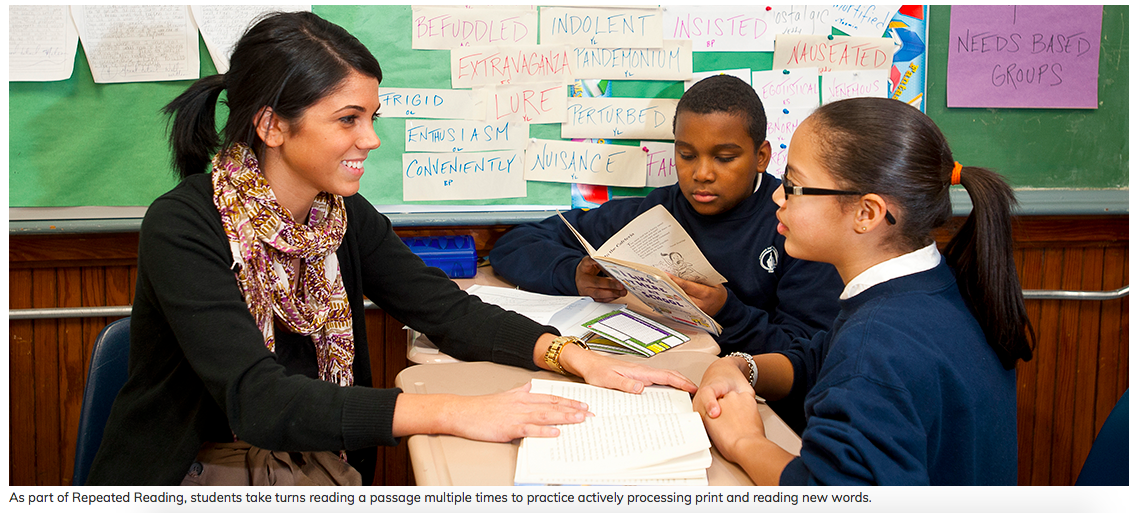|
Throughout my educational career - from special education teacher to reading interventionist to classroom co-teacher – I loved the point in the year when young readers “took off.” Seemingly out of the blue, they suddenly became much more fluent readers. When students entered this stage of their reading development, their rate and accuracy increased dramatically and they were able to confidently and quickly traverse whole paragraphs, even when the written terrain became difficult. For decades reading research has shown us that reading fluency - the ability to read accurately, at an appropriate rate, and with proper expression and phrasing - is essential to reading comprehension (LaBerge & Samuels, 1974; Stevens, Walker, & Vaughn, 2017). One especially effective and efficient practice that builds students’ reading fluency is guided repeated reading. The activity provides less skilled readers with the opportunity to hear a model of fluent reading and then practice the same passage in a way that minimizes errors. Additionally, reading aloud with others (often with the teacher) builds confidence, lessens the stress of reading independently and supports any student who feels shy or nervous about reading out loud. Capitalized Repeated Reading Repeated Reading is the specific (and thus capitalized) routine pioneered by researcher Jay Samuels. It has been shown to be effective at improving the oral reading fluency of elementary students, including those with learning disabilities (Kim, Bryant, Bryant, & Park, 2017; Stevens et al., 2017; Lee & Yoon, 2017). The routine shares these key ingredients with other varieties of repeated reading (such as echo reading, choral reading and Radio Reading):
Through its very nature, Samuel’s routine gives students lots of reading practice. It goes, however, above and beyond garden varieties of repeated reading. According to Timothy Shanahan, “Repeated Reading is a particular method … to develop decoding automaticity with struggling readers. In this approach, students are asked to read aloud short text passages (50-200 words) until they reach a criterion level of success - particular speed and accuracy goals” (Shanahan, 2020). Said another way, the routine uses goal setting, instant error correction, and peer mediation to boost all components of reading fluency. Photo from IRRC's website article on Repeated Reading (courtesy Merrimack College School of Education/Flickr)
Putting Repeated Reading to Use Repeated reading of all types typically leads to improved reading performance, especially for low performing readers (Zawoyski, et. al., 2014), with the biggest payoffs being more accurate word reading, improved oral reading fluency, and more reading comprehension (Shanahan, 2020). Still, some schools and teachers don’t make use of this powerful practice. Here’s what dyslexia researcher Sally Shaywitz has to say: “…the proven effectiveness of guided repeated oral reading to increase fluency is too often ignored. That is unacceptable. In fact, the evidence is so strong that I urge adoption of these programs as an integral part of every school reading curriculum throughout primary school” (Shaywitz, p. 233). Fortunately, it doesn’t take much time and effort to understand and then adopt the practice in your reading block. If you would like to understand Samuel’s Repeated Reading routine well enough to use it with your readers who struggle, here are three resources to explore - just follow the links:
The work of S. Jay Samuels has had a profound impact on the field of reading instruction. Dr. Samuels passed away last year in December. Whether they know it or not, teachers who engage in quality reading instruction have been influenced by Dr. Samuels and countless children have become better readers because of his insights. If you’d like to read about S. Jay Samuel’s life and reflect on his accomplishments, follow this link and read the “in memorium.” Citations and Sources
Comments are closed.
|
Mark WeaklandI am a teacher, literacy consultant, author, musician, nature lover, and life long learner.
|

 RSS Feed
RSS Feed